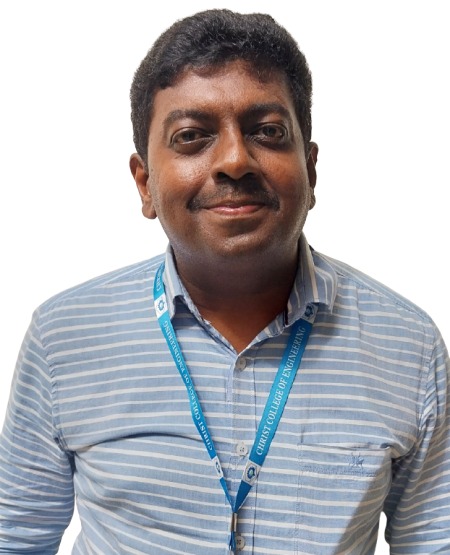About
Electronics and Communication Engineering is an engineering discipline that plays a pivotal role in making human life easier through technology revolution. From basic RC circuits to nanochips and telephones to 5G, electronics is involved everywhere. Due to its global technical relevance, immense opportunities await an Electronics and Communication Engineer in industry and research. The Department of Electronics and Communication Engineering at Christ College of Engineering is dedicated to nurture young budding engineers by bringing the best out of them. It strives to develop among its students an attitude to innovate, design, analyze and implement systems for future global requirements in the ever-changing technology scenario. Well-equipped labs, smart classrooms along with the adept teaching learning methods followed in the Department ensure a quality learning experience for students.
Departments
Home / Academics / Department / About
Vision
To be a premier center of education, research and innovation in Electronics and Communication Engineering that nurtures adept engineers responsive to global challenges and societal needs.
Mission
- 1.
To enhance the teaching-learning process by implementing state-of-the-art practices suitable for a challenging technological world.
- 2.
To promote innovative research in emerging areas for the advancement of knowledge towards developing sustainable solutions for the society.
- 3.
To foster ethics, values and an urge for continuous improvement vital for professionals to emerge as responsible leaders.
Academic Uniqueness
- 1.
Ongoing Government funded projects (DST, IIT Palakkad) and consultancy works.
- 2.
Student activities under the banner of ECTA and professional body activities under IEEE and IETE.
- 3.
Hardware library to facilitate student innovations.
- 4.
Exposure to project development and prototyping through semester projects and hackathons.
- 5.
Training in the state of the art technology through value added courses and expert talks
- 6.
Student-centred teaching and learning to mould industry ready engineers
Programme Details
Program Educational Objectives (PEOs) expand_more
PEO-1
Acquire state of the art knowledge in the discipline of Electronics & Communication Engineering to be able to design and develop innovative and cost- effective products to fulfill multidisciplinary challenges.
PEO-2
Apply skills and knowledge to pursue a growth oriented career in industry, academics, and entrepreneurship exhibiting global competitiveness.
PEO-3
Exhibit professional integrity, work ethics, and commitment towards the principles of sustainability while exercising the role of a responsible engineer.
Program Outcomes (POs) expand_more
PO-1
Engineering Graduates will be able to:Engineering knowledge: Apply the knowledge of mathematics, science, engineering fundamentals, and an engineering specialization to the solution of complex engineering problems.
PO-2
Problem analysis: Identify, formulate, review research literature, and analyze complex engineering problems reaching substantiated conclusions using first principles of mathematics, natural sciences, and engineering sciences.
PO-3
Design/development of solutions: Design solutions for complex engineering problems and design system components or processes that meet the specified needs with appropriate consideration for the public health and safety, and the cultural, societal, and environmental considerations.
PO-4
Conduct investigations of complex problems: Use research-based knowledge and research methods including design of experiments, analysis and interpretation of data, and synthesis of the information to provide valid conclusions.
PO-5
Modern tool usage: Create, select, and apply appropriate techniques, resources, and modern engineering and IT tools including prediction and modeling to complex engineering activities with an understanding of the limitations.
PO-6
The engineer and society: Apply reasoning informed by the contextual knowledge to assess societal, health, safety, legal and cultural issues and the consequent responsibilities relevant to the professional engineering practice.
PO-7
Environment and sustainability: Understand the impact of the professional engineering solutions in societal and environmental contexts, and demonstrate the knowledge of, and need for sustainable development.
PO-8
Ethics: Apply ethical principles and commit to professional ethics and responsibilities and norms of the engineering practice.
PO-9
Individual and team work: Function effectively as an individual, and as a member or leader in diverse teams, and in multidisciplinary settings.
PO-10
Communication: Communicate effectively on complex engineering activities with the engineering community and with society at large, such as, being able to comprehend and write effective reports and design documentation, make effective presentations, and give and receive clear instructions.
PO-11
Project management and finance: Demonstrate knowledge and understanding of the engineering and management principles and apply these to one’s own work, as a member and leader in a team, to manage projects and in multidisciplinary environments.
PO-12
Life-long learning: Recognize the need for, and have the preparation and ability to engage in independent and life-long learning in the broadest context of technological change.
Program Specific Outcomes (PSOs) expand_more
PSO-1
Apply the concepts of Communication Engineering, VLSI, Embedded systems, Signal Processing and allied disciplines to analyze, design and develop engineering systems.
PSO-2
Proficiently use the latest hardware and software tools relevant to Electronics and Communication Engineering in solving real world engineering problems.
PSO-3
Foster professional ethics, adaptive attitude, managerial skills and an inquisitive mind for continuous learning, essential for the core and allied engineering practices.



























